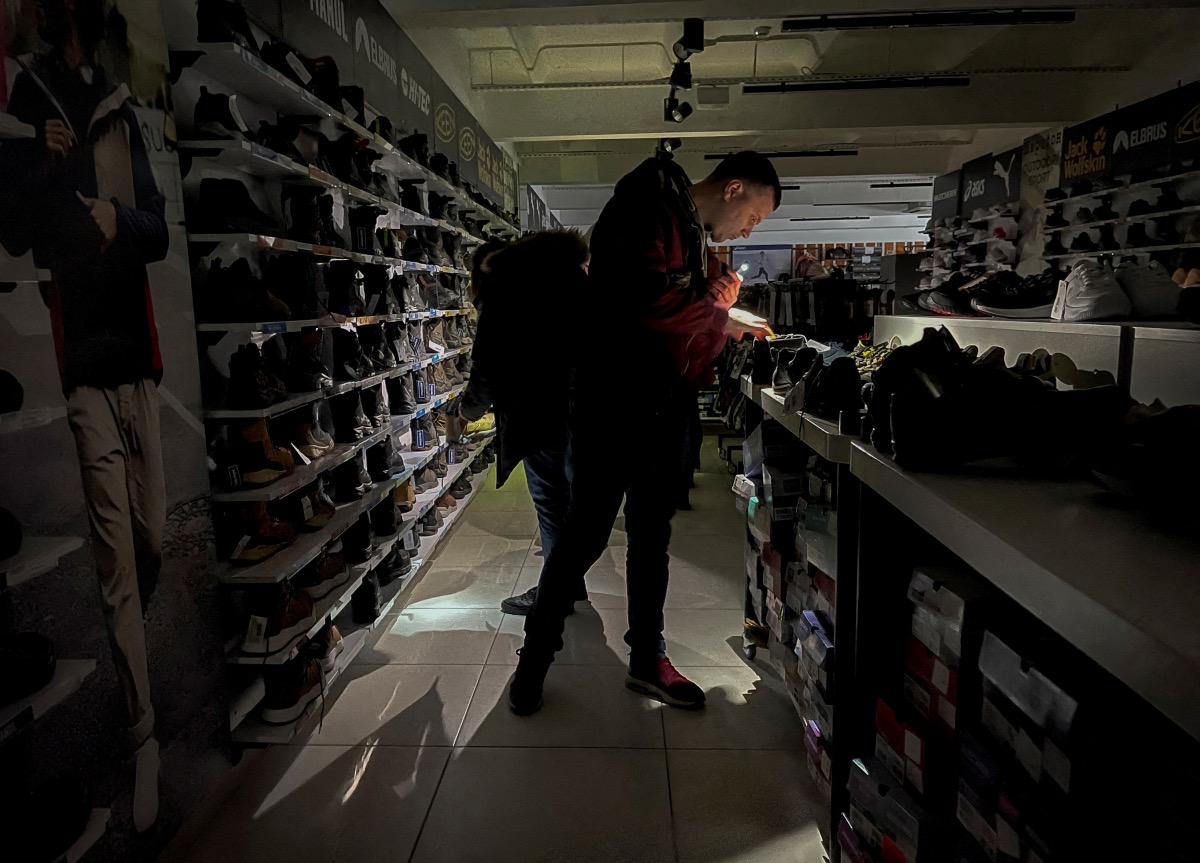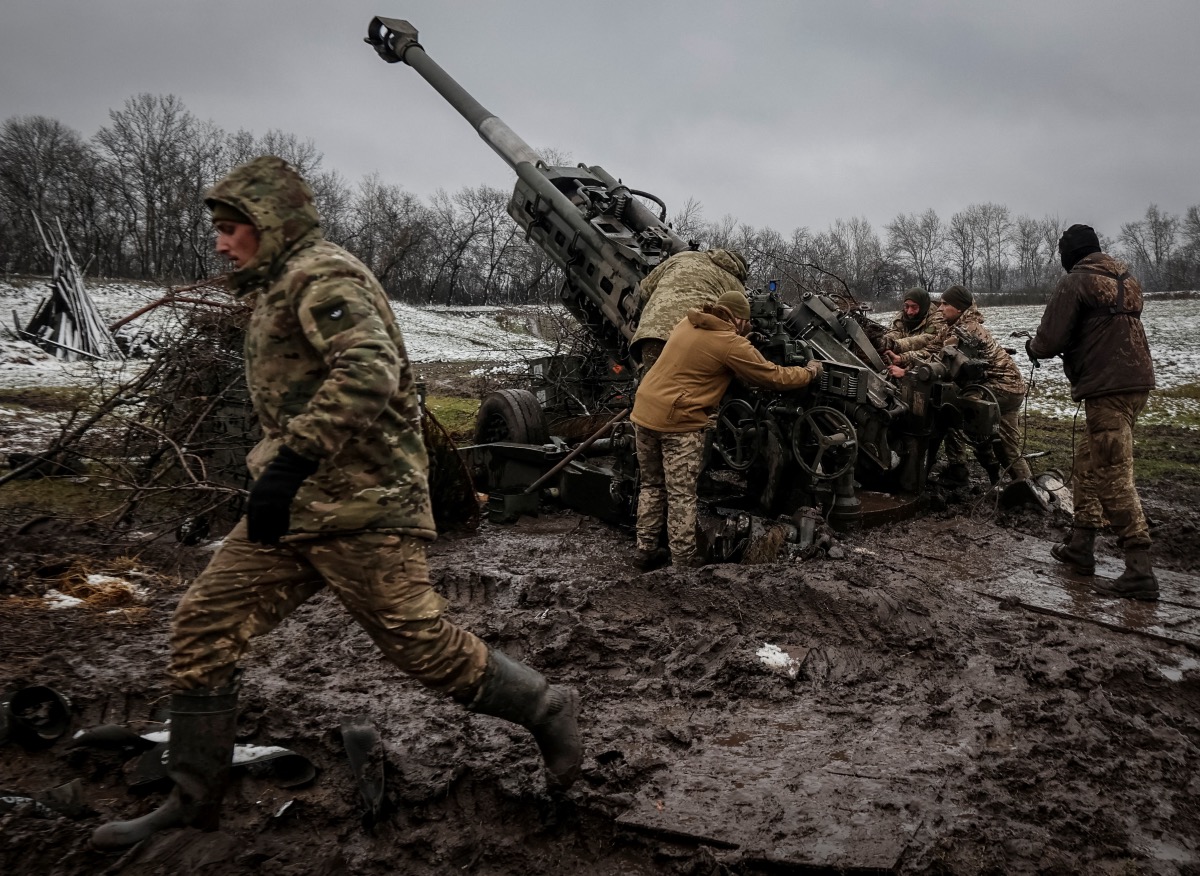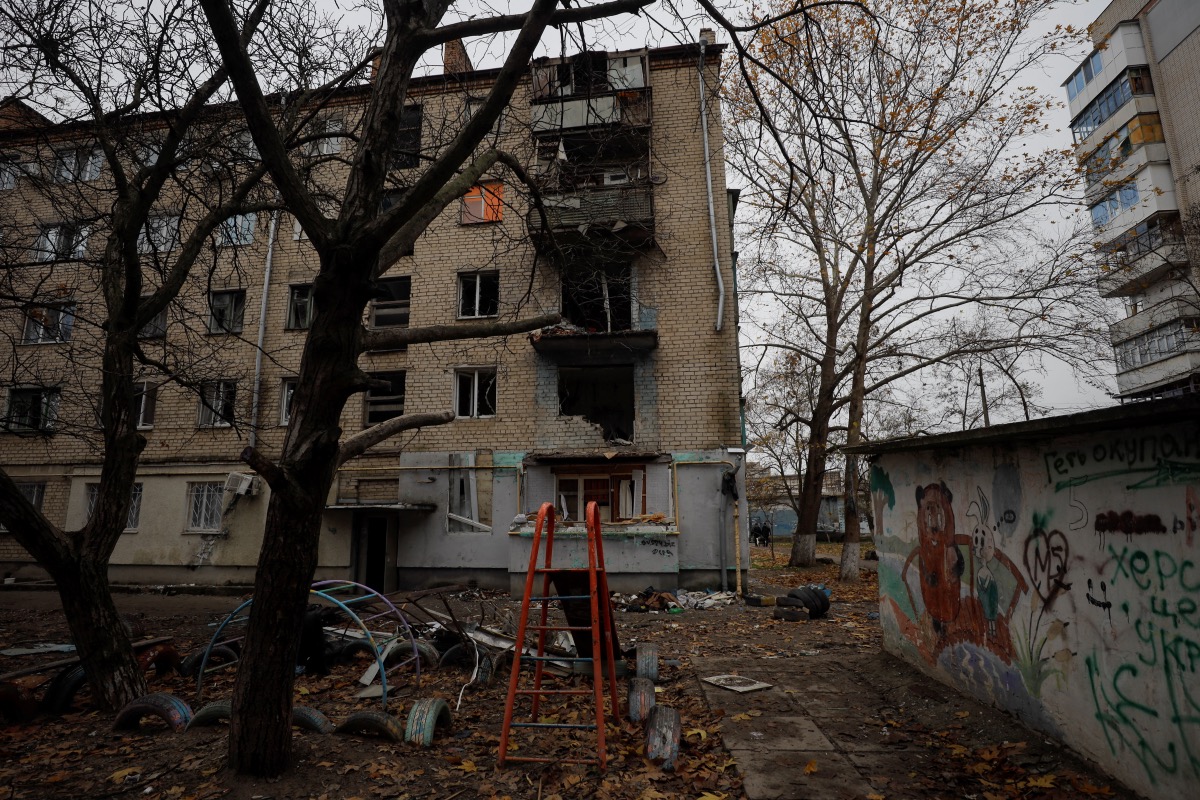Kyiv/Kherson, Ukraine
Reuters
President Volodymyr Zelenskiy warned Ukrainians to expect another brutal week of cold and darkness ahead, predicting more Russian attacks on infrastructure that would not cease until Moscow ran out of missiles.
Russia has been carrying out massive missile bombardments on Ukraine’s energy infrastructure roughly weekly since early October, with each barrage having greater impact than the last as damage accumulates and a frigid winter sets in.

People use their mobile phone lamps to look at items at a sporting goods store during a power outage, after critical civil infrastructure was hit by a Russian missile attacks in Ukraine, as Russia’s invasion of Ukraine continues, in Kyiv, on 26th November. PICTURE: Reuters/Gleb Garanich/File photo.
In an overnight address, Zelenskiy said he expected new attacks this week that could be as bad as last week’s – the worst yet – that left millions of people with no heat, water or power.
“We understand that the terrorists are planning new strikes. We know this for a fact,” Zelenskiy said in his nightly video address. “And as long as they have missiles, they, unfortunately, will not calm down.”
Kyiv says the attacks, which Russia acknowledges target Ukrainian infrastructure, are intended to harm civilians, making them a war crime. Moscow denies its intent is to hurt civilians but said last week their suffering would not end unless Ukraine yielded to Russia’s demands, without spelling them out.
In Kyiv, snow fell and temperatures were hovering around freezing as millions in and around the Ukrainian capital struggled with disruptions to electricity supply and central heating caused by the waves of Russian air strikes.
National grid operator Ukrenergo said on Monday it had been forced to resume regular emergency blackouts in areas across the country after a setback in its race to repair energy infrastructure.
Power units at several power stations had to conduct emergency shutdowns and demand for electricity has been rising as snowy winter weather has set in, a Ukrenergo statement said.
“Once the causes of the emergency shutdowns are eliminated, the units will return to operation, which will reduce the deficit in the power system and reduce the amount of restrictions for consumers,” it said.
At the front lines, the looming winter is ushering in a new phase of the conflict with intense trench warfare along heavily fortified positions, after several months of Russian retreats.
With Russian forces having pulled back in the northeast and withdrawn across the Dnipro River in the south, the front line on land is only around half the length it was a few months ago, making it harder for Ukrainian forces to find poorly defended stretches to mount a new breakthrough.
Zelenskiy described heavy fighting along part of the front west of the city of Donetsk, where Russia has focused its assault even as its troops withdrew elsewhere, and both sides claim massive casualties with little change in positions.
Ukraine’s armed forces General Staff said in its daily update on Monday that Ukrainian forces had repelled Russian attacks in Bakhmut and Avdiivka in that area.

Ukrainian service members fire a shell from an M777 Howitzer at a front line, as Russia’s attack on Ukraine continues, in Donetsk Region, Ukraine on 23rd November. PICTURE: Radio Free Europe/Radio Liberty/Serhii Nuzhnenko via Reuters.
Kremlin denies plan to withdraw from nuclear plant
The Kremlin denied Russia had any plans to withdraw from the Zaporizhzhia nuclear power plant, Europe’s largest, which it has controlled since early in the war near the front line on a reservoir on the Dnipro.
The head of Ukraine’s nuclear power operator, Petro Kotkin, had said on Sunday there were signs Russia might pull out. But Kremlin spokesman Dmitry Peskov responded on Monday: “There’s no need to look for signs where there are none and cannot be any.”
Russia says it has annexed the area and put the plant under the control of its nuclear power agency.
The UN nuclear watchdog, the IAEA, has called for the plant and surrounding area to be demilitarised to prevent a nuclear disaster.
We rely on our readers to fund Sight's work - become a financial supporter today!
For more information, head to our Subscriber's page.
In Kherson, a southern city that has been without power or heat since Russian forces abandoned it earlier this month, regional governor Yaroslav Yanushevych said 17 per cent of customers now had electricity. Other districts would be hooked up soon.
Russian forces who withdrew have been bombarding from across the river, killing dozens of civilians. Reuters spoke to Liliia Khrystenko, 38, who recounted how her parents were both killed last Thursday when their building was hit while she was inside with her young son.
“I heard my father screaming, telling me to call an ambulance, because my mother was wounded. But I couldn’t call an ambulance, because the [mobile] connection was gone,” she said through tears outside the building.
“I went outside with my child, and my mother was lying in the building entrance, face down, covered in blood. And my father was sitting by her side, saying he was going to die.”
Khystenko’s mother’s body lay on the street for a day before being removed. Her father had been hit in the liver by shrapnel and medics were unable to revive him in hospital.

A view shows an apartment building damaged by a recent Russian military strike in Kherson, Ukraine, on 27th November. PICTURE: Reuters/Anna Voitenko
Ukraine has gained an advantage on the battlefield in part from deploying Western rocket systems that allow it to target Russian positions behind the front lines, partly neutralising Moscow’s advantage in artillery firepower.
In the latest example of Western military aid to Kyiv, the United States is considering a proposal by Boeing to supply Ukraine with cheap, small precision bombs that can fit onto rockets with a range of 150 kilometres, putting more Russian targets within range.
Boeing’s proposed system, dubbed Ground-Launched Small Diameter Bomb, is one of about a half-dozen plans for getting new munitions into production for Ukraine and America’s eastern European allies, industry sources said.
– With OLEKSANDR KOZHUKHAR and PAVEL POLITYUK in Kyiv, RONALD POPESKI in Winnipeg, Canada, and LIDIA KELLY in Melbourne, Australia.






